Welcome to our midweek Millennial Round Table show. Joining Kerby around the table today are Dr. Chris Kouba, lead pastor at Prestonwood Baptist Church North Campus, Denison Forum’s Nick Pitts and conservative millennial blogger, Allie Beth Stuckey. Together they will look at various issues in the news this week and give you their biblical perspective.
Call us in-studio at 800-351-1212 and have your say.
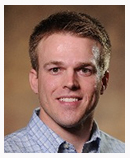
family units and serving Christ.

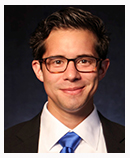
He came to the Denison Forum in 2014 after a fateful conversation with its founder, Dr. Jim Denison. Pitts, a Ph.D. candidate at Dallas Baptist University (DBU), had spent the summer studying at Oxford with other students and faculty including Denison, a visiting professor.
He contributes to the Forum in the areas of geopolitics and popular culture, as well as serving as the editor of the Daily Briefing. He continues work on his doctorate and serves as an adjunct professor at DBU, teaching a master’s level course in the philosophy of leadership.
His Ph.D. research centers upon John F. Kennedy’s engagement of the religious community in the 1960 presidential campaign. He presented a paper on the topic at Calvin College’s 2015 symposium on religion and public life.
He is an editor at large for The Liberty Project, an online magazine, and his op-eds have been published by The Philadelphia Inquirer, Religion News Service and Townhall.com.
He received a bachelor’s degree in 2007 from Austin Peay State University in Clarksville, Tennessee, and a master’s degree in 2009 from Southwestern Baptist Theological Seminary in Fort Worth, Texas.
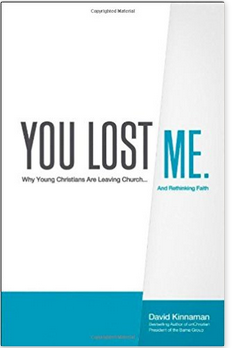
David Kinnaman’s You Lost Me has its roots in stories like these. Thousands of stories. Nearly five thousand interviews with and about eighteen-to-twenty-nine-year-olds in the United States. The project conducted by Kinnaman’s Barna Group stretched from 2007 to 2011, launched eight new social scientific studies, and reanalyzed Barna’s twenty-seven years of interviews and polls for data regarding the youngest generation of Americans and their relationship to the church. You Lost Me reads as a capstone report to this research, distilling it, analyzing, suggesting next steps.
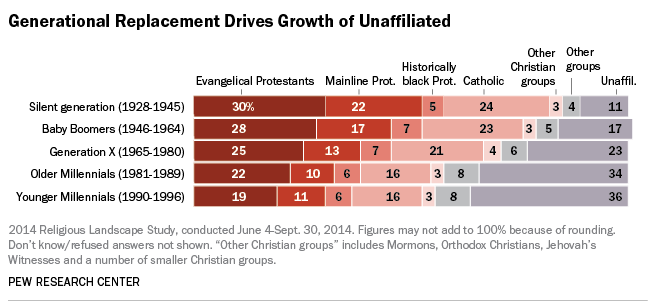
A high percentage of younger members of the Millennial generation – those who have entered adulthood in just the last several years – are religious “nones” (saying they are atheists or agnostics, or that their religion is “nothing in particular”). At the same time, an increasing share of older Millennials also identify as “nones,” with more members of that group rejecting religious labels in recent years.
Overall, 35% of adult Millennials (Americans born between 1981 and 1996) are religiously unaffiliated. Far more Millennials say they have no religious affiliation compared with those who identify as evangelical Protestants (21%), Catholics (16%) or mainline Protestants (11%).
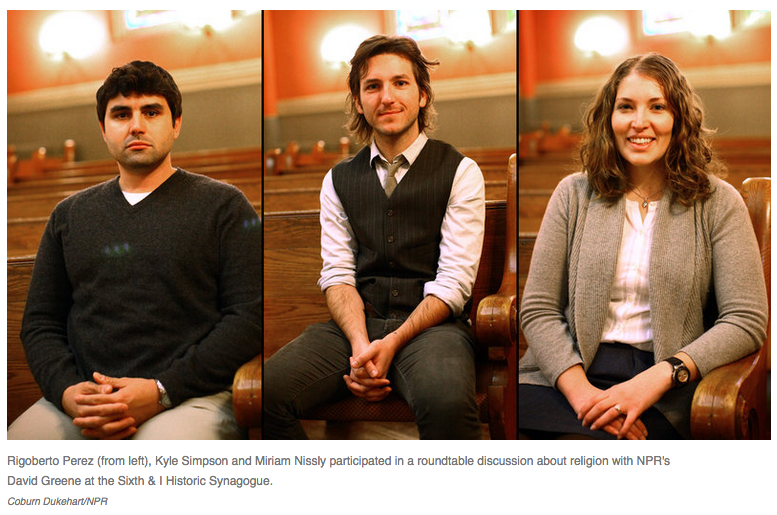
NPR's David Greene wanted to understand why, so he gathered a roundtable of young people at a synagogue in Washington, D.C. The 6th & I Historic Synagogue seemed like the right venue: It's both a holy and secular place that has everything from religious services to rock concerts. Greene speaks with six people — three young women and three young men — all struggling with the role of faith and religion in their lives.

Alexander Hernandez, 30, is a member of a label-averse generation alternately inspired and appalled by the 2016 election — and a growing number of them are throwing their hats in the ring to run for themselves. On Crowdpac, a millennial leaning crowdfunding site,
 Listen Online
Listen Online Watch Online
Watch Online Find a Station in Your Area
Find a Station in Your Area


 Watch Now
Watch Now Listen Now
Listen Now 
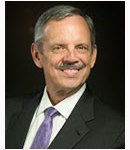




 Listen Now
Listen Now Watch Online
Watch Online
